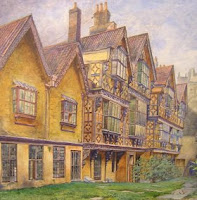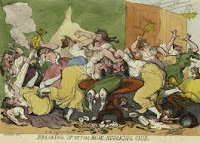by Diane Scott Lewis
The Society for the Reformation of Manners was founded in 1691 in London. While concerned with brothels and prostitution, it also insisted that the poor (because the rich could never behave in such a way) needed instruction to tame their lewd and blasphemous behaviors.
In league with the Society for the Promotion of Christian Knowledge, the organization concerned itself with the morals and manners of those creatures who were less fortunate, and therefore, easily led astray.
Since the Revolution of 1688, England believed she had a special connection with divine providence, and must live up to that standard. Reformer Josiah Woodward opined that: "National sins deserve national judgments."
In Bristol, England, a local "manners" society started prosecuting people for swearing and other indecent behavior. People were beaten and put in pillories for these infractions. A woman was arrested for "Disorderly Walking."

In 1704, Bristol’s poor were referred to as "lousing like swarms of locusts in every corner of the streets." The indigent were morally contaminating the urban environment by their very appearance.
Workhouses and infirmaries were tasked with taming the poor. In one workhouse, groups of pauper girls were stripped, washed and given decent clothes, because outward changes led to inner ones. Appearance, behavior, and moral worth were all the same. They were then sent to hard labor. The girls’ emotions and personal feelings were never a consideration.
If the poor became ill, they couldn’t enter the infirmary unless they had clean clothes, because only respectable paupers should be healed. Charities were relied upon to provide these items. Inside the infirmary, no smoking, dice or cards was allowed as the people should be removed from corrupt influences. Patients were exposed to daily prayers, and some establishments had Biblical texts painted on the walls. Every ward had Bibles or prayer books, ignoring the fact that the majority of the poor couldn’t read.
 |
| Bristol Mint/workhouse/St. Peter's Hospital |
Charity schools taught religion and compliance, but little about how to improve your lot in life. The indulgent upper classes believed that everyone should know and remain in their proper place. The poor would stay poor, but should work hard and behave themselves. If work was difficult to find, and people starved, they should never swear about it and still attend church every Sunday, or they’d end up in gaol.
The reason the lower orders were so ill-behaved was attributed to England’s liberal freedoms. Clergyman Josiah Tucker called the poor brutal, insolent, debauched, and idle in their religion. He claimed that England was so careful of personal freedoms that "our People are drunk with the cup of Liberty." His sermons became so damning, that he was followed in the streets by pauper boys who hurled insults at him. The refining of the poor obviously wasn’t working.
 |
| Josiah Tucker |
Resource: Patients, Power, and the Poor in Eighteenth-Century Bristol, by Mary E. Fissell, 1991
~~~~~~~~~~~~
For more on the turbulent eighteenth century, check out my novels:
http://www.dianescottlewis.org


the more things change the more they remain the same, Clergy man Josiah Tucker could give the opening prayer for today's American GOP.
ReplyDelete"The indulgent upper classes believed that everyone should know and remain in their proper place. The poor would stay poor, but should work hard and behave themselves. If work was difficult to find, and people starved, they should never swear about it and still attend church every Sunday, or they’d end up in gaol."
ReplyDeleteWow...scary, isn't it?